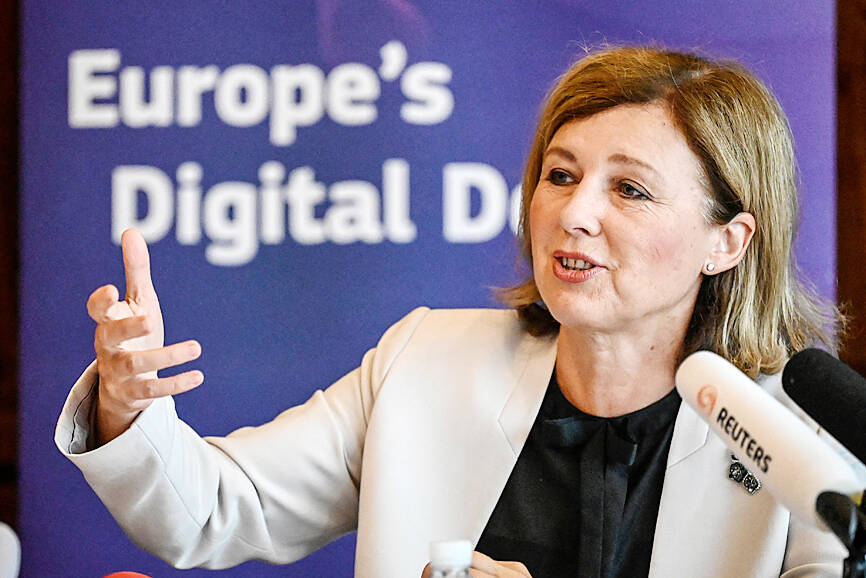The European Commission’s digital chief yesterday said that murky Chinese laws were fueling concerns among foreign firms in the country, following discussions with Beijing officials about critical areas such as artificial intelligence (AI) and data governance.
Vera Jourova, who is also the commission’s vice president, made the comments after meeting on Monday with Chinese counterparts including Vice Premier Zhang Guoqing (張國清) in the second “High-level Digital Dialogue” between the two sides.
Among the concerns Jourova said she had heard about from European businesses in China was the “unpredictability of the decisions and interpretation of the laws by the regulators.”

Photo: AFP
Beijing has recently implemented expansive new regulations covering cybersecurity, counterespionage and data management, citing the need to shore up national security measures.
However, the new regulations have worried some foreign firms, unsure of how their enforcement would affect their business operations in the world’s second-largest economy.
“First thing is the not-very-clear wording of the laws, especially missing definitions of, for instance, what is ‘important data,’ and what ... the companies could be confronted with when transferring the data outside,” Jourova told reporters.
Jourova also criticized the “lengthy procedures” foreign firms must undergo to conduct business in the country.
“I think it’s 45 days for one process — it lasts very often a much longer time,” she said. “Nobody is criticizing the Chinese laws, we just want them to be clear and relatively easy to comply with.”
Jourova’s visit to Beijing comes just days after Brussels announced a probe into Chinese subsidies for electric vehicles, which it said had resulted in unfair competition.
China said that the investigation would have a negative effect on its trade relations with the bloc, accusing it of “naked protectionism.”
Deteriorating ties between China and the West over the past few years have given rise to concerns in Brussels over the potential vulnerabilities posed by AI, misinformation and data security.
“The EU does not seek to decouple from China, but we need to improve our resilience and competitiveness by derisking our economic interdependencies and advancing our technology security agenda in order to remain competitive and protect our essential European interests,” Jourova said.

When an apartment comes up for rent in Germany’s big cities, hundreds of prospective tenants often queue down the street to view it, but the acute shortage of affordable housing is getting scant attention ahead of today’s snap general election. “Housing is one of the main problems for people, but nobody talks about it, nobody takes it seriously,” said Andreas Ibel, president of Build Europe, an association representing housing developers. Migration and the sluggish economy top the list of voters’ concerns, but analysts say housing policy fails to break through as returns on investment take time to register, making the

EARLY TALKS: Measures under consideration include convincing allies to match US curbs, further restricting exports of AI chips or GPUs, and blocking Chinese investments US President Donald Trump’s administration is sketching out tougher versions of US semiconductor curbs and pressuring key allies to escalate their restrictions on China’s chip industry, an early indication the new US president plans to expand efforts that began under former US president Joe Biden to limit Beijing’s technological prowess. Trump officials recently met with their Japanese and Dutch counterparts about restricting Tokyo Electron Ltd and ASML Holding NV engineers from maintaining semiconductor gear in China, people familiar with the matter said. The aim, which was also a priority for Biden, is to see key allies match China curbs the US

NOT TO WORRY: Some people are concerned funds might continue moving out of the country, but the central bank said financial account outflows are not unusual in Taiwan Taiwan’s outbound investments hit a new high last year due to investments made by contract chipmaker Taiwan Semiconductor Manufacturing Co (TSMC, 台積電) and other major manufacturers to boost global expansion, the central bank said on Thursday. The net increase in outbound investments last year reached a record US$21.05 billion, while the net increase in outbound investments by Taiwanese residents reached a record US$31.98 billion, central bank data showed. Chen Fei-wen (陳斐紋), deputy director of the central bank’s Department of Economic Research, said the increase was largely due to TSMC’s efforts to expand production in the US and Japan. Investments by Vanguard International

STRUGGLING TO SURVIVE: The group is proposing a consortium of investors, with Tesla as the largest backer, and possibly a minority investment by Hon Hai Precision Nissan Motor Co shares jumped after the Financial Times reported that a high-level Japanese group has drawn up plans to seek investment from Elon Musk’s Tesla Inc to aid the struggling automaker. The group believes the electric vehicle (EV) maker is interested in acquiring Nissan’s plants in the US, the newspaper reported, citing people it did not identify. The proposal envisions a consortium of investors, with Tesla as the largest backer, but also includes the possibility of a minority investment by Hon Hai Precision Industry Co (鴻海精密) to prevent a full takeover by the Apple supplier, the report said. The group is